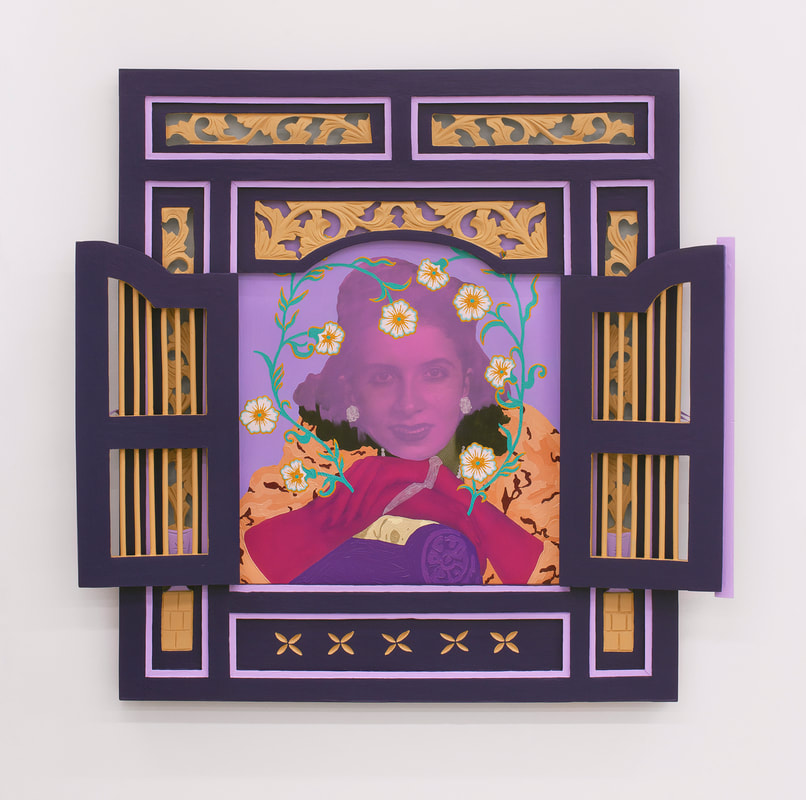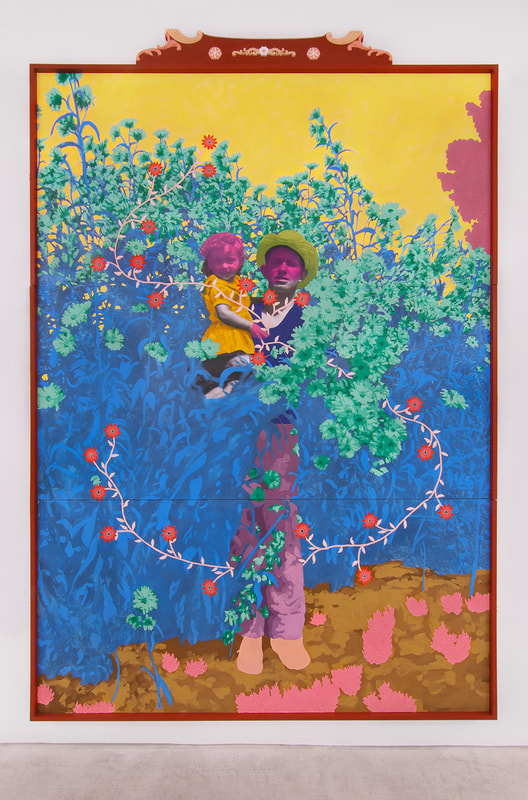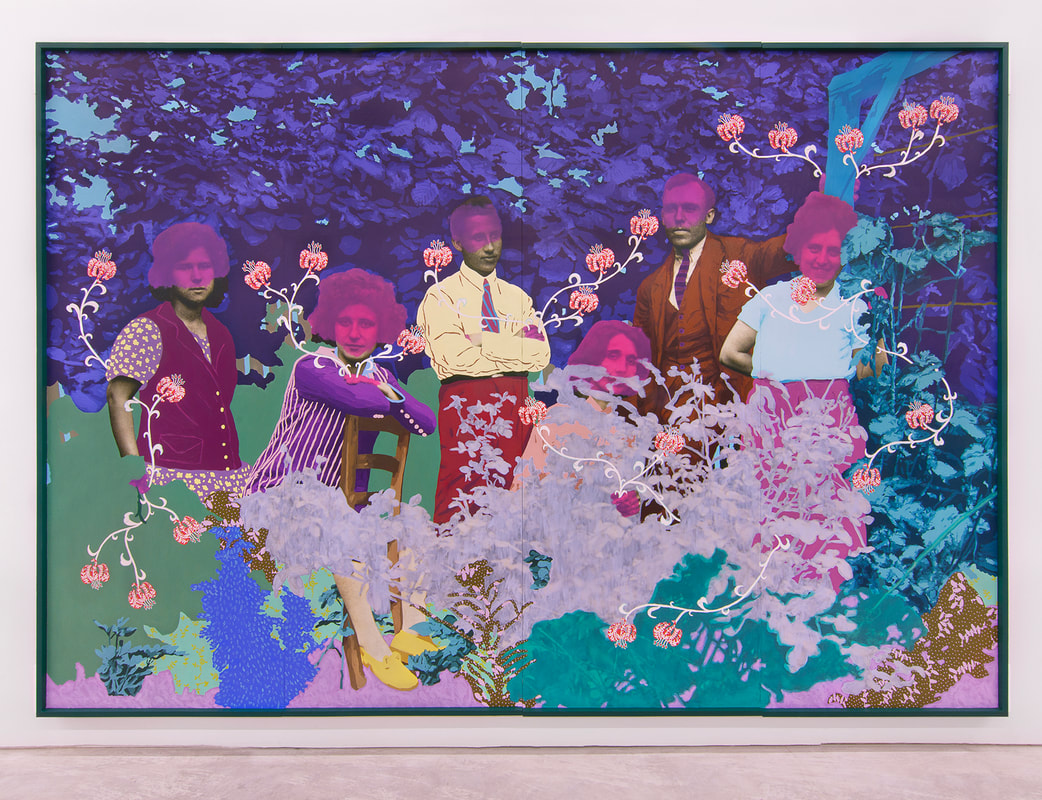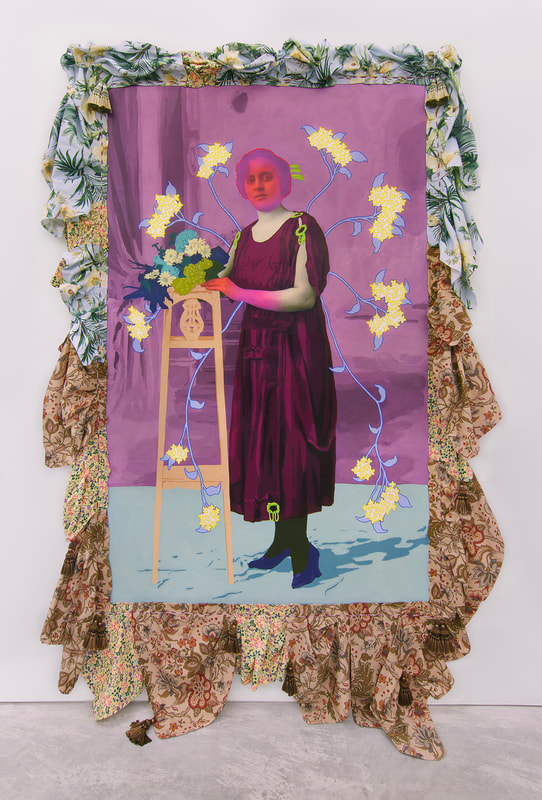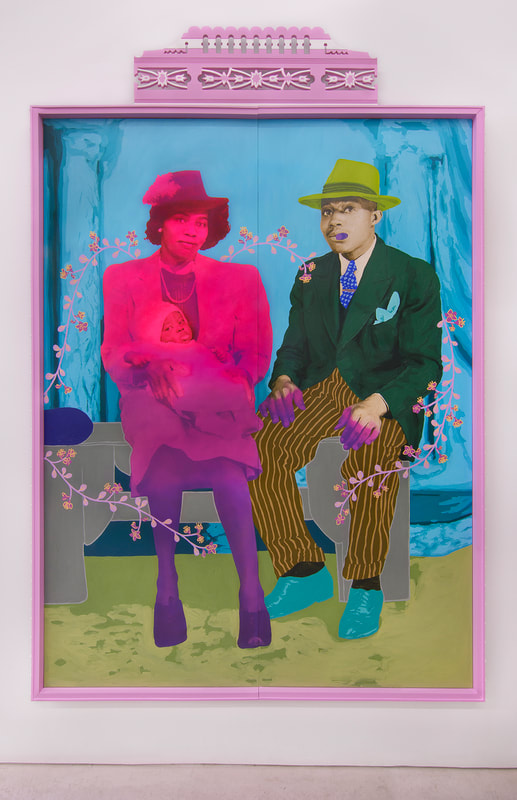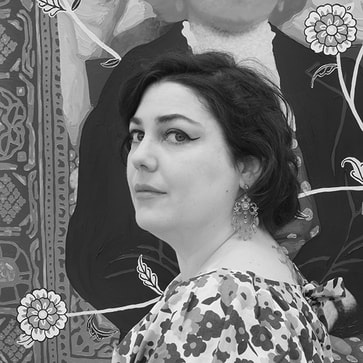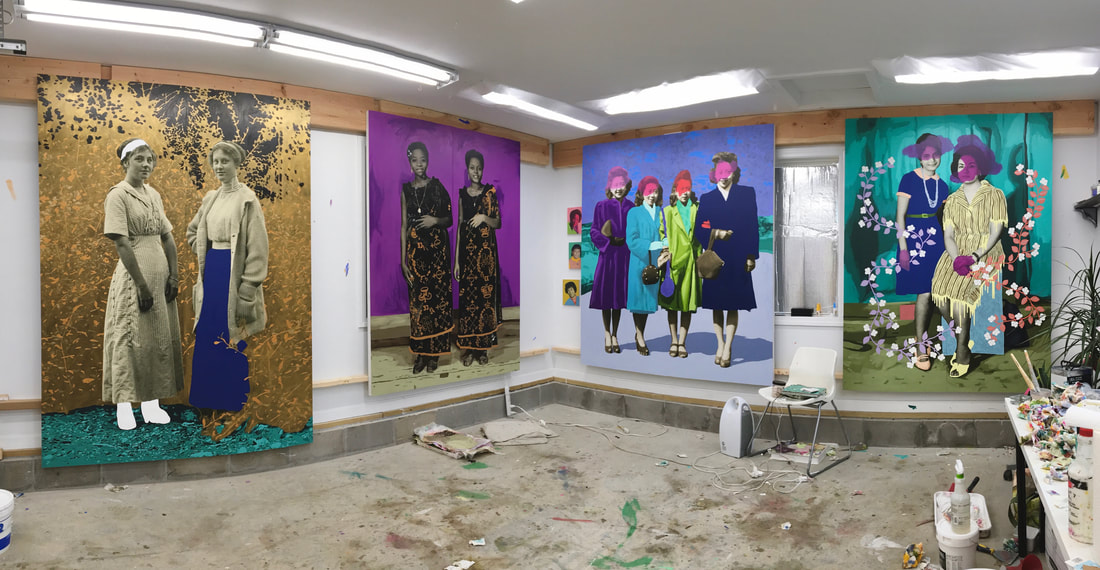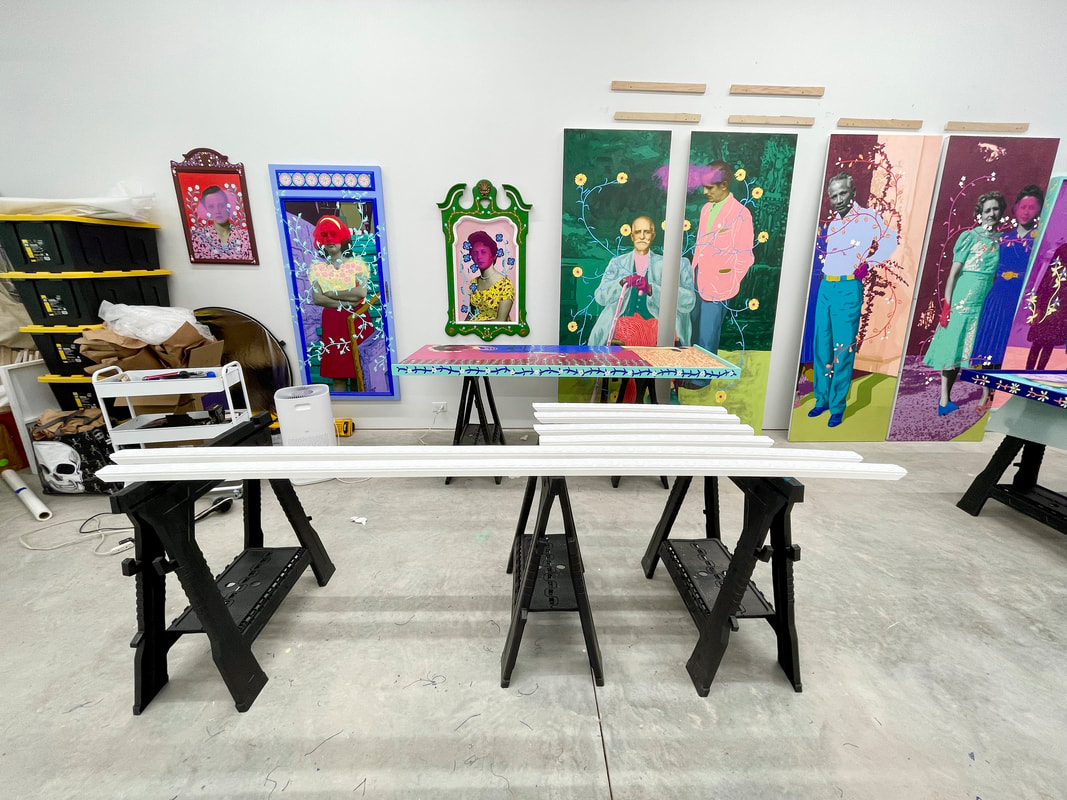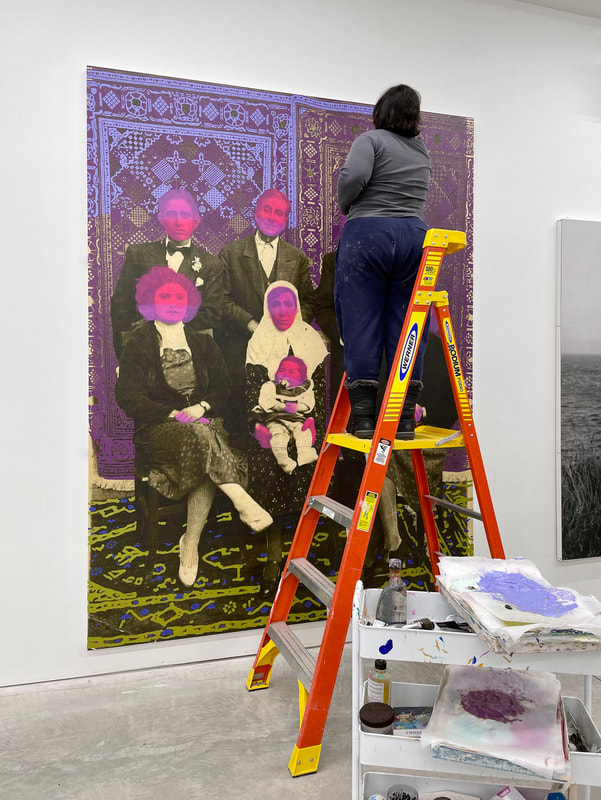Daisy Patton is a multi-disciplinary artist who was born in Los Angeles, CA to a mother from the South and an Iranian father she never met. She spent her childhood between California and Oklahoma, deeply affected by these conflicting cultural ways of being. Influenced by collective and political history, as well as memory and the fallibility of the body, Patton’s work explores the meaning and social conventions of families, relationship, storytelling and story-carrying, and also connection. One prominent series, "Forgetting is so long," has been featured in publications such as Hyperallergic, The Jealous Curator, The Denver Post, The Chautauquan Daily, and more. Currently residing in western Massachusetts, Patton has a BFA in Studio Arts from the University of Oklahoma with minors in History and Art History and an Honors degree. She earned her MFA from The School of the Museum of Fine Arts, Boston/Tufts University, a multi-disciplinary program. Patton has completed artist residencies at Minerva Projects, Anderson Ranch, the Studios at MASS MoCA, RedLine Denver, and Eastside International in Los Angeles. She has been awarded the Barbara Deming Memorial Fund grant, as well as the Assets for Artists Massachusetts Matched Savings grant and the Montage Travel Award from SMFA for research in Dresden, Germany. She has exhibited in solo and group shows nationally, including her first museum solo at the CU Art Museum at the University of Colorado. Minerva Projects Press will publish a collection of essays and poetry on Patton’s practice in fall 2020. K Contemporary represents Patton in Denver, CO, and J. Rinehart represents her in Seattle, WA.
Published on April 19th, 2021. Artist responses collected in months previous.
What hurdles have you overcome this year and how have they affected your art practice?
This past year has been difficult, and that's without a global pandemic. Moving from Seattle to western MA was a massive challenge, and then getting my home studio ready took more time than hoped. The delays made me fall behind in preparing for the two exhibitions scheduled for 2020. The first was closed almost immediately due to COVID, while the work for the second show is going up mid-September. There have been technical issues that that haven't fully been resolved in some cases. Moreover, my health, always at its lowest during summer months, has had a few stumbles, mostly caused from overwork and stress. I want to have a much-needed restorative time away for recharging and reflecting, which I haven't quite done. I’ve usually work on smaller, lower stakes work after breaks, and this seems to be no different at the moment. Despite all the hardships, I feel that I have been able to advance artistically, complicating my painting work and realizing a series that has been in progress for 5 years, “Put Me Back Like They Found Me.”
How has your art practice been affected by the pandemic?
The spring was my time to be able to get to know my new artistic community and region, since the fall was filled with getting my studio working and show prep. That, of course, has not happened I had hoped. Since I am disabled, I have postponed any kind of local/national residency applications until we have a vaccine and/or treatment. Working has helped avoid some existential dread of worrying about the illness for myself, but it is present for loved ones. Because I have moved to different states twice in the past two years, I feel a little isolated. I have been in lock-down and not left my house since March, so I am definitely feeling stagnated. As with many artists, I lost income and had projects canceled, but I’m more worried about our current political climate and the coming economic depression that will result from this hellscape of a year.
What support systems have you put in place to help keep your practice thriving amidst these unforeseeable circumstances?
I am grateful that I connected with the fabricators and builders for my new panels. In past moments where I have been really busy, reaching out to friends for coffee dates or studio visits or even a phone call helps prevent becoming overwhelmed. Those supports are mostly not available, beyond phone calls, which have felt more than I have been able to handle lately. To be honest, I’ve actually not been able to sow the supports I have really needed, but I am planning to during my eventual resting period. Some of that includes finishing filing and preparing my office, which has been so disorganized across several moves. It’s something I should have done many years ago and is therefore much harder now, but it will get done! In addition to those elements of self-care, I want to institute better routines and sleep schedules (going to bed at 5am every night is not great). Finally, I am also trying to finish creating a proper business plan for debt reduction and other goals I have for my career through a grant award from Assets for Artists of MASS MoCA. My deadline is Oct. 31st, so I still have some time!
What methods do you employ to stay resilient in your art practice? What tips would you recommend to other artists who find staying resilient difficult?
Resilience is a marathon and a practice. I think that falling into a consistent, stable routine is helpful—in periods of uncertainty, you can still function without feeling the pressures of thinking/worrying/reinventing the wheel. Many of my difficulties this past year has been a lack of routine, or previous ways of working being upended by constant instability, so this is very much a priority. I think reaching out to other artists is also crucial, to share and commiserate. I have had several conversations recently that center around how hard this period is for all of us, as artists and people. However, I also think it's important to make space for those of us who have spent so much time being resilient and feel drained right now. Rest is a partner of and required to be resilient—working on fumes does not make the best art or state of mind. Artists are needed to help think of different, hopeful futures. This means our learning resilience can be transferred to other ways of creating, or encouraging, change.
What have you learned about yourself as an artist this year?
If my answers seem disheartening, it’s because I realized I’d burned out about six months ago in the middle of painting my show. I have learned to be mindful that my energy levels will continue to decrease as I age and my illness grows worse. I need to schedule self-care, though to be fair so much of this year’s problems was from the limbo and delays from multiple moves. That is thankfully over for, well, hopefully forever! I’d thought I needed a city to feel fulfilled as an artist and have community, and while the pandemic has delayed some relationship-building, I’ve also learned how much being surrounded by nature has been indispensable. I try to hike often, which helps for the neural/physical strengthening. I started Pilates because my muscles have grown more spastic/non-responsive, which has been tremendously helpful when I make time for it. I’ve had some painful failures this year, but I am hopeful those lessons are ones that will help me grow and be nimbler. I think that the more we, as artists, pay attention to what works and doesn’t within our practice and the larger goals we have, the more we can achieve the goals we have.
What hurdles have you overcome this year and how have they affected your art practice?
This past year has been difficult, and that's without a global pandemic. Moving from Seattle to western MA was a massive challenge, and then getting my home studio ready took more time than hoped. The delays made me fall behind in preparing for the two exhibitions scheduled for 2020. The first was closed almost immediately due to COVID, while the work for the second show is going up mid-September. There have been technical issues that that haven't fully been resolved in some cases. Moreover, my health, always at its lowest during summer months, has had a few stumbles, mostly caused from overwork and stress. I want to have a much-needed restorative time away for recharging and reflecting, which I haven't quite done. I’ve usually work on smaller, lower stakes work after breaks, and this seems to be no different at the moment. Despite all the hardships, I feel that I have been able to advance artistically, complicating my painting work and realizing a series that has been in progress for 5 years, “Put Me Back Like They Found Me.”
How has your art practice been affected by the pandemic?
The spring was my time to be able to get to know my new artistic community and region, since the fall was filled with getting my studio working and show prep. That, of course, has not happened I had hoped. Since I am disabled, I have postponed any kind of local/national residency applications until we have a vaccine and/or treatment. Working has helped avoid some existential dread of worrying about the illness for myself, but it is present for loved ones. Because I have moved to different states twice in the past two years, I feel a little isolated. I have been in lock-down and not left my house since March, so I am definitely feeling stagnated. As with many artists, I lost income and had projects canceled, but I’m more worried about our current political climate and the coming economic depression that will result from this hellscape of a year.
What support systems have you put in place to help keep your practice thriving amidst these unforeseeable circumstances?
I am grateful that I connected with the fabricators and builders for my new panels. In past moments where I have been really busy, reaching out to friends for coffee dates or studio visits or even a phone call helps prevent becoming overwhelmed. Those supports are mostly not available, beyond phone calls, which have felt more than I have been able to handle lately. To be honest, I’ve actually not been able to sow the supports I have really needed, but I am planning to during my eventual resting period. Some of that includes finishing filing and preparing my office, which has been so disorganized across several moves. It’s something I should have done many years ago and is therefore much harder now, but it will get done! In addition to those elements of self-care, I want to institute better routines and sleep schedules (going to bed at 5am every night is not great). Finally, I am also trying to finish creating a proper business plan for debt reduction and other goals I have for my career through a grant award from Assets for Artists of MASS MoCA. My deadline is Oct. 31st, so I still have some time!
What methods do you employ to stay resilient in your art practice? What tips would you recommend to other artists who find staying resilient difficult?
Resilience is a marathon and a practice. I think that falling into a consistent, stable routine is helpful—in periods of uncertainty, you can still function without feeling the pressures of thinking/worrying/reinventing the wheel. Many of my difficulties this past year has been a lack of routine, or previous ways of working being upended by constant instability, so this is very much a priority. I think reaching out to other artists is also crucial, to share and commiserate. I have had several conversations recently that center around how hard this period is for all of us, as artists and people. However, I also think it's important to make space for those of us who have spent so much time being resilient and feel drained right now. Rest is a partner of and required to be resilient—working on fumes does not make the best art or state of mind. Artists are needed to help think of different, hopeful futures. This means our learning resilience can be transferred to other ways of creating, or encouraging, change.
What have you learned about yourself as an artist this year?
If my answers seem disheartening, it’s because I realized I’d burned out about six months ago in the middle of painting my show. I have learned to be mindful that my energy levels will continue to decrease as I age and my illness grows worse. I need to schedule self-care, though to be fair so much of this year’s problems was from the limbo and delays from multiple moves. That is thankfully over for, well, hopefully forever! I’d thought I needed a city to feel fulfilled as an artist and have community, and while the pandemic has delayed some relationship-building, I’ve also learned how much being surrounded by nature has been indispensable. I try to hike often, which helps for the neural/physical strengthening. I started Pilates because my muscles have grown more spastic/non-responsive, which has been tremendously helpful when I make time for it. I’ve had some painful failures this year, but I am hopeful those lessons are ones that will help me grow and be nimbler. I think that the more we, as artists, pay attention to what works and doesn’t within our practice and the larger goals we have, the more we can achieve the goals we have.
Find Daisy Patton on Instagram
